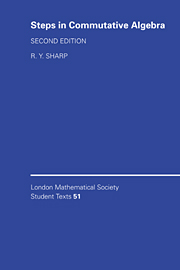Book contents
- Frontmatter
- Contents
- Preface to the 1st Edition
- Preface to the 2nd Edition
- 1 Commutative rings and subrings
- 2 Ideals
- 3 Prime ideals and maximal ideals
- 4 Primary decomposition
- 5 Rings of fractions
- 6 Modules
- 7 Chain conditions on modules
- 8 Commutative Noetherian rings
- 9 More module theory
- 10 Modules over principal ideal domains
- 11 Canonical forms for square matrices
- 12 Some applications to field theory
- 13 Integral dependence on subrings
- 14 Afflne algebras over fields
- 15 Dimension theory
- 16 Regular sequences and grade
- 17 Cohen–Macaulay rings
- Bibliography
- Index
9 - More module theory
Published online by Cambridge University Press: 06 January 2010
- Frontmatter
- Contents
- Preface to the 1st Edition
- Preface to the 2nd Edition
- 1 Commutative rings and subrings
- 2 Ideals
- 3 Prime ideals and maximal ideals
- 4 Primary decomposition
- 5 Rings of fractions
- 6 Modules
- 7 Chain conditions on modules
- 8 Commutative Noetherian rings
- 9 More module theory
- 10 Modules over principal ideal domains
- 11 Canonical forms for square matrices
- 12 Some applications to field theory
- 13 Integral dependence on subrings
- 14 Afflne algebras over fields
- 15 Dimension theory
- 16 Regular sequences and grade
- 17 Cohen–Macaulay rings
- Bibliography
- Index
Summary
This chapter is concerned more with useful techniques rather than with results which are interesting in their own right. Enthusiasm to reach exciting theorems has meant that certain important technical matters which are desirable for the efficient further development of the subject have been postponed. For example, we met Nakayama's Lemma in 8.24, but we did not develop in Chapter 8 the useful applications of Nakayama's Lemma to finitely generated modules over quasi-local rings. Also, although we undertook a thorough study of rings of fractions and their ideals in Chapter 5, we have still not developed the natural extension of that theory to modules of fractions. Again, the theory of primary decomposition of ideals discussed in Chapter 4 has an extension to modules which is related to the important concept of Associated prime ideal of a module over a commutative Noetherian ring.
These topics will be dealt with in this chapter. In addition, the theory of modules of fractions leads on to the important idea of the support of a module, and this is another topic which we shall explore in this chapter.
We begin with some consequences of Nakayama's Lemma.
9.1 Remarks. Let M be a module over the commutative ring R. By a minimal generating set for M we shall mean a subset, say Δ, of M such that Δ generates M but ℕ0 proper subset of Δ generates M.
- Type
- Chapter
- Information
- Steps in Commutative Algebra , pp. 167 - 184Publisher: Cambridge University PressPrint publication year: 2001

